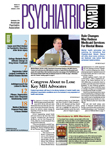Psychiatrists must watch for subtle symptoms of mania before prescribing antidepressants for bipolar patients during a depressive episode because of a significant risk of inducing mania in this particular subgroup of patients, a new study suggests.
In the clinical trial conducted by the Bipolar Collaborative Network (formerly the Stanley Foundation Bipolar Network), 176 adult patients with bipolar depression were treated with adjunctive antidepressants for 10 weeks. The authors found that patients who experienced treatment-emergent mania—a rapid mood switch from depression to mania or hypomania—had significantly higher levels of motor activity, speech, and language-thought disorder on the Young Mania Rating Scale (YMRS) at baseline, compared with patients who did not have this adverse outcome.
The patients who experienced treatment-emergent mania also had a significantly higher total YMRS score at baseline than patients who did not have treatment-emergent mania. By analyzing YMRS items that are found to relate to each other, the authors identified a significant correlation between treatment-emergent mania and higher scores for motor/verbal activation at baseline.
Forty-six patients had treatment-emergent mania, specifically defined as a mania severity score of 4 or greater (moderate to severe) on the Clinical Global Impression scale for bipolar disorder (CGI-BP) or a change in score of 6 or 7 (much worse or very much worse) during the 10-week trial.
The authors conducted post hoc analyses on data from a randomized, controlled clinical trial that had compared the efficacy and safety among three antidepressants—venlafaxine, sertraline, and bupropion—as an adjunct to a mood stabilizer. The trial was conducted at six sites in the United States, the Netherlands, and Germany. The same group of authors previously reported in the February 2006 American Journal of Psychiatry that venlafaxine was linked to the highest risk of mood switch, and bupropion with the lowest risk.
The causes of rapid mood switch associated with antidepressant treatment are not completely understood. Some antidepressants such as tricyclics are known to pose a higher risk for inducing mood switch. Past studies also indicate that patients with the rapid-cycling type of disorder and in mixed episodes are more likely to have a mood switch when they take antidepressants.
“It is important to emphasize that large, placebo-controlled studies suggest that antidepressant treatment [as adjunct to mood stabilizers] is no more efficacious than placebo for bipolar patients treated with mood-stabilizing medications,” said Roy Perlis, M.D., M.Sc., in an interview. He is the medical director of the Bipolar Clinical and Research Program and Center for Human Genetic Research at Massachusetts General Hospital and an assistant professor of psychiatry at Harvard Medical School.
“So, before we talk about the risk of mood switch, we need to consider whether any amount of risk is worthwhile,” added Perlis, who served as an investigator in the National Institute of Mental Health's Systematic Treatment Enhanced Program for Bipolar Disorder (STEP-BD) trial.
Data from the STEP-BD trial indicated that in bipolar patients with simultaneous manic symptoms and full-blown depression, adjunctive antidepressants were not significantly more effective than placebo and may exacerbate mania (Psychiatric News, September 21, 2007).
“What the current study makes clear is that, among previously suggested clinical features, few are useful for predicting mood switch. The one set of features... significantly associated with switch were manic symptoms,” said Perlis. In other words, when a patient is depressed, having more manic symptoms is a sign that he or she is closer to a manic or mixed state. “The closer you are to mania, the more likely you are to become manic after [antidepressant] treatment; this is not a big surprise. However, this finding underscores the important point that all depressed patients need to be carefully evaluated for manic/hypomanic symptoms prior to initiating or changing treatment,” he emphasized.
The current study was funded by the Stanley Medical Research Institute and published online in AJP in Advance on November 17, 2008.
Combined with other similar findings, the authors concluded that“ short-term use of antidepressants may have liabilities—induction of mania or hypomania or persistence of manic or hypomanic symptoms—in bipolar depressed patients who have minimal manic symptoms at baseline.”
“A careful examination for... specific symptoms of mania is warranted prior to antidepressant treatment for bipolar depression,” they recommended.
“Correlates of Treatment-Emergent Mania Associated With Antidepressant Treatment in Bipolar Depression” is posted at<ajp.psychiatryonline.org/cgi/reprint/appi.ajp.2008.08030322v1>.▪
